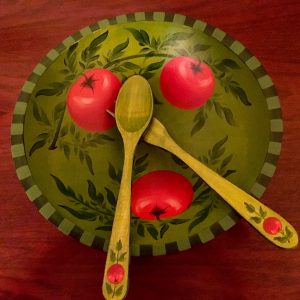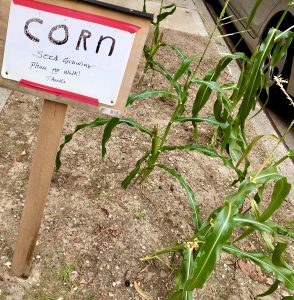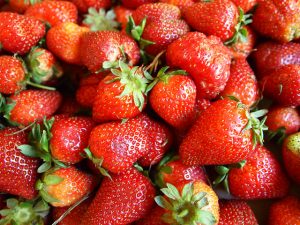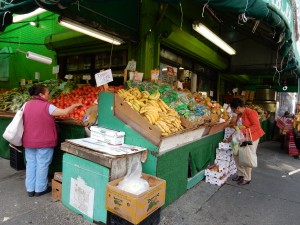Tag: sustainable-food-systems
November 24, 2020
By Pamela Berns
Covid-19 has created disruptions in all aspects of our lives, challenging us to change our habits and lifestyles, only to have to change them yet again. “Pivot” and “shift” have become the buzzwords of 2020, and although it’s been exhausting, one might even say we’ve gotten enough practice to be become masters of behavior change. This holiday season is no different, unfolding like no other in memory, demanding that we revisit some of our most fundamental practices and revise our most cherished rituals. With social distancing and the unfortunate winter surge, more families are opting to go smaller at home. They are improvising strategies for virtual get togethers and seeking meaning in unfamiliar ways, hoping to compensate at least a little for lost hugs and after dinner walks.

If COVID-19 is calling on us to change the way we eat together, it also necessitates greater mindfulness in the way we plan and prepare and our meals. Smaller guest lists mean buying and cooking less, and ultimately wasting less. Many studies have shown that how we produce and consume food is one of the biggest drivers of our planet’s deteriorating health, wrote
Brent Loken, Global Food Lead Scientist with the World Wildlife Federation (WWF) on October 8.
(more…)
By Alexa Roccanova
Amidst a convergence of contemporary crises, private and public actors alike have championed sustainability as the ultimate goal for an environmentally, socially, and economically sound future. We’ve witnessed an inundation of seemingly “sustainable” alternatives for products, technologies, lifestyles, and systems that pose only slightly better versions of the status-quo — alternatives that by themselves, without a significant shift in the dynamic of our dominant systems, will not be enough to effectively mitigate climate change.

But there exist generations of people who have already been living sustainably for centuries. Indigenous peoples all over the world have been tending to the Earth, conserving local ecosystems, preserving biodiversity, and maintaining their ancestral cosmovisions, knowledges, and practices, despite incessant efforts by colonizer nations and institutions to displace, assimilate, and terminate them. The survival of their communities and lifeways is itself a testament to the sustainability of their culturally and spiritually guided relations with the environment.
“Humankind has not woven the web of life. We are but one thread within it. Whatever we do to the web, we do to ourselves. All things are bound together. All things connect.”– Chief Seattle, Duwamish
(more…)
September 22, 2020

By Tamanna Mohapatra and Pamela Berns
After a long spring and summer of streaming and one too many Zooms, many city dwellers started craving something three-dimensional, organic and more nurturing to the body and soul. One therapy that emerged was growing our own herbs and vegetables at home—or at least trying to. We’ve used whatever spaces we’ve had—unused corners in small apartments, windowsills, kitchen counters, balconies (for those lucky enough to have one), and whatever little patches of lawn we could possibly cultivate. One Upper West Sider even appropriated a former city street tree planter to sprout corn stalks.
(more…)
May 24, 2017
by Sunitha Sarveswaran

Most people look at strawberry tops or carrot peels and throw them away, without realizing the myriad of other uses these scraps could provide. According to the EPA, the most preferred use for food and organics is human consumption. The least preferred uses are landfill and incineration. The GreenHomeNYC April Forum on Sustainable Food Systems featured a panel of five experts who spoke about the different strategies communities, businesses, and building owners can employ in order to limit or eliminate their organic waste footprint.
Communities can make a difference
According to the
New York City Department of Sanitation, more than a third of all waste generated by New York City residents is organic waste. Michael Hurwitz, the Director of the
GreenMarket Program and GrowNYC, spoke about how consumers can make a large impact on the organic waste footprint of New York City. Greenmarket was founded in 1976 with two main goals: to keep local farms viable and to ensure New Yorkers have unlimited access to fresh, local produce. Hurwitz discussed how one third of all food grown goes unharvested due to the cosmetic preferences of vendors. GreenMarket takes this unwanted produce and sells it at their local markets. Greenmarket’s passion is educating consumers on how to prepare food so that every part is used and scraps are not wasted. Greenmarket provides recipes, canning presentations and workshops to help consumers minimize their food waste and stretch their dollar.
(more…)
April 29, 2015
By Pamela Berns
The New School celebrated Earth Day with a day-long event entitled “Earth Matters: Designing Our Future.” The program consisted of panel discussions ranging from sustainable fashion to climate change, with speakers from organizations as varied as NRDC, the Municipal Art Society, and the Mayor’s Office of Recovery and Resiliency.

In a session about sustainable food systems, the expression “you are what you eat” took on new meaning with a presentation on urban food planning by Dr. Rosita Ilieva. Dr. Ilieva is a Post-Doctoral Research Fellow at the Tishman Environment and Design Center at The New School, where she teaches and researches urban food systems and sustainable cities in the Environmental Studies program. She also has earned a Ph.D. Cum Laude in Spatial Planning and Urban Development from the Polytechnic University of Milan.
(more…)
 If COVID-19 is calling on us to change the way we eat together, it also necessitates greater mindfulness in the way we plan and prepare and our meals. Smaller guest lists mean buying and cooking less, and ultimately wasting less. Many studies have shown that how we produce and consume food is one of the biggest drivers of our planet’s deteriorating health, wrote Brent Loken, Global Food Lead Scientist with the World Wildlife Federation (WWF) on October 8. (more…)
If COVID-19 is calling on us to change the way we eat together, it also necessitates greater mindfulness in the way we plan and prepare and our meals. Smaller guest lists mean buying and cooking less, and ultimately wasting less. Many studies have shown that how we produce and consume food is one of the biggest drivers of our planet’s deteriorating health, wrote Brent Loken, Global Food Lead Scientist with the World Wildlife Federation (WWF) on October 8. (more…)
 But there exist generations of people who have already been living sustainably for centuries. Indigenous peoples all over the world have been tending to the Earth, conserving local ecosystems, preserving biodiversity, and maintaining their ancestral cosmovisions, knowledges, and practices, despite incessant efforts by colonizer nations and institutions to displace, assimilate, and terminate them. The survival of their communities and lifeways is itself a testament to the sustainability of their culturally and spiritually guided relations with the environment.
“Humankind has not woven the web of life. We are but one thread within it. Whatever we do to the web, we do to ourselves. All things are bound together. All things connect.”– Chief Seattle, Duwamish
(more…)
But there exist generations of people who have already been living sustainably for centuries. Indigenous peoples all over the world have been tending to the Earth, conserving local ecosystems, preserving biodiversity, and maintaining their ancestral cosmovisions, knowledges, and practices, despite incessant efforts by colonizer nations and institutions to displace, assimilate, and terminate them. The survival of their communities and lifeways is itself a testament to the sustainability of their culturally and spiritually guided relations with the environment.
“Humankind has not woven the web of life. We are but one thread within it. Whatever we do to the web, we do to ourselves. All things are bound together. All things connect.”– Chief Seattle, Duwamish
(more…)
 By Tamanna Mohapatra and Pamela Berns
After a long spring and summer of streaming and one too many Zooms, many city dwellers started craving something three-dimensional, organic and more nurturing to the body and soul. One therapy that emerged was growing our own herbs and vegetables at home—or at least trying to. We’ve used whatever spaces we’ve had—unused corners in small apartments, windowsills, kitchen counters, balconies (for those lucky enough to have one), and whatever little patches of lawn we could possibly cultivate. One Upper West Sider even appropriated a former city street tree planter to sprout corn stalks. (more…)
By Tamanna Mohapatra and Pamela Berns
After a long spring and summer of streaming and one too many Zooms, many city dwellers started craving something three-dimensional, organic and more nurturing to the body and soul. One therapy that emerged was growing our own herbs and vegetables at home—or at least trying to. We’ve used whatever spaces we’ve had—unused corners in small apartments, windowsills, kitchen counters, balconies (for those lucky enough to have one), and whatever little patches of lawn we could possibly cultivate. One Upper West Sider even appropriated a former city street tree planter to sprout corn stalks. (more…)
 Most people look at strawberry tops or carrot peels and throw them away, without realizing the myriad of other uses these scraps could provide. According to the EPA, the most preferred use for food and organics is human consumption. The least preferred uses are landfill and incineration. The GreenHomeNYC April Forum on Sustainable Food Systems featured a panel of five experts who spoke about the different strategies communities, businesses, and building owners can employ in order to limit or eliminate their organic waste footprint.
Communities can make a difference
According to the New York City Department of Sanitation, more than a third of all waste generated by New York City residents is organic waste. Michael Hurwitz, the Director of the GreenMarket Program and GrowNYC, spoke about how consumers can make a large impact on the organic waste footprint of New York City. Greenmarket was founded in 1976 with two main goals: to keep local farms viable and to ensure New Yorkers have unlimited access to fresh, local produce. Hurwitz discussed how one third of all food grown goes unharvested due to the cosmetic preferences of vendors. GreenMarket takes this unwanted produce and sells it at their local markets. Greenmarket’s passion is educating consumers on how to prepare food so that every part is used and scraps are not wasted. Greenmarket provides recipes, canning presentations and workshops to help consumers minimize their food waste and stretch their dollar.
(more…)
Most people look at strawberry tops or carrot peels and throw them away, without realizing the myriad of other uses these scraps could provide. According to the EPA, the most preferred use for food and organics is human consumption. The least preferred uses are landfill and incineration. The GreenHomeNYC April Forum on Sustainable Food Systems featured a panel of five experts who spoke about the different strategies communities, businesses, and building owners can employ in order to limit or eliminate their organic waste footprint.
Communities can make a difference
According to the New York City Department of Sanitation, more than a third of all waste generated by New York City residents is organic waste. Michael Hurwitz, the Director of the GreenMarket Program and GrowNYC, spoke about how consumers can make a large impact on the organic waste footprint of New York City. Greenmarket was founded in 1976 with two main goals: to keep local farms viable and to ensure New Yorkers have unlimited access to fresh, local produce. Hurwitz discussed how one third of all food grown goes unharvested due to the cosmetic preferences of vendors. GreenMarket takes this unwanted produce and sells it at their local markets. Greenmarket’s passion is educating consumers on how to prepare food so that every part is used and scraps are not wasted. Greenmarket provides recipes, canning presentations and workshops to help consumers minimize their food waste and stretch their dollar.
(more…)
 In a session about sustainable food systems, the expression “you are what you eat” took on new meaning with a presentation on urban food planning by Dr. Rosita Ilieva. Dr. Ilieva is a Post-Doctoral Research Fellow at the Tishman Environment and Design Center at The New School, where she teaches and researches urban food systems and sustainable cities in the Environmental Studies program. She also has earned a Ph.D. Cum Laude in Spatial Planning and Urban Development from the Polytechnic University of Milan.
In a session about sustainable food systems, the expression “you are what you eat” took on new meaning with a presentation on urban food planning by Dr. Rosita Ilieva. Dr. Ilieva is a Post-Doctoral Research Fellow at the Tishman Environment and Design Center at The New School, where she teaches and researches urban food systems and sustainable cities in the Environmental Studies program. She also has earned a Ph.D. Cum Laude in Spatial Planning and Urban Development from the Polytechnic University of Milan.
